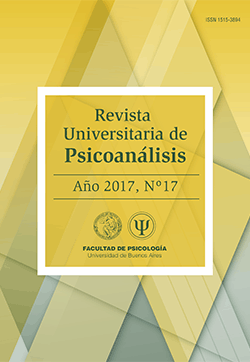La palabra y la ironía en la esquizofrenia.
The word and the irony in schizophrenia.
Autor/es: Gonzalo Javier López
Universidad de Buenos Aires (UBA). Facultad de Psicología. Licenciado en Psicología (UBA). Psicoanalista. Docente en la Cátedra de Psicoanálisis: Freud II y “Clínica de Adultos I”. (UBA).
Enseñante del Colegio Clínico del Río de la Plata; Miembro de Escuela del Foro Analítico del Río de la plata; Editor de la Revista SIC (FARP); Ex integrante y coordinador de Residentes y Concurrentes en el Servicio TCP1 del Hospital Borda de la Ciudad de Buenos Aires.
E-Mail:
thymoshomero@yahoo.com.ar
RESUMEN
La desconexión del lazo con el otro es característica de la propia estructura esquizofrénica, lo observamos en pacientes que están verdaderamente aislados, sumidos en una apatía generalizada. Estos pacientes son la expresión clínica más pura de la esquizofrenia como estructura clínica que se caracteriza por el rechazo al lazo social y la resignación de la investidura de objeto. Pero en algunos esquizofrénicos observamos cierta aptitud para intentar reestablecer el lazo social. Intento del que habla Freud cuando conceptualiza el fenómeno de la palabra en la esquizofrenia y del que habla también Lacan cuando plantea una elección irónica signada por la insistencia. Ese intento restitutivo genera un efecto irónico cuando, como interlocutores, escuchamos esos dichos que tratan cosas concretas como si fueran abstractas. Cuando el otro es convocado, a partir de esos enunciados del esquizofrénico que desde su referencia apuntan a lo concreto, se dispone al lazo social, pero, cuando constata que esa referencia no responde a la exigencia discursiva de transparencia y es, por lo tanto, opaca, abstracta, aparece el efecto irónico en el que el intento de restitución es al mismo tiempo ataque al lazo social.
El lazo social roto por estructura, el intento de restitución del lazo social y el efecto irónico que el intento de restitución genera constituyen los tres tiempos del fenómeno esquizofrénico de la palabra y su relación con la ironía que trabajaremos aquí.
Palabras clave:
Palabra - Esquizofrenia - Ironía - Insistencia
SUMMARY
The disconnection of the tie with the other is a characteristic of the proper schizophrenic structure, we observe this in patients that are truly isolated, submerged in a generalized apathy. These patients are the most pure clinic expression of schizophrenia as a clinic structure that is characterized by the reject of the social tie and the resignation of the investiture of the object. But in some schizophrenic we observe a certain attitude to try to re-establish the social tie. An attempt which is mentioned by Freud when he contextualizes the phenomenon of the word in schizophrenia and which is also referred to by Lacan when he establishes an ironic election signed by insistence. That restored attempt generate an ironic effect when, as interlocutors, we listen to these sayings that treat concrete things as if they were abstract. When the other is summoned, starting from those announcements of the schizophrenic that from his reference points to the concrete, he is disposed to the social tie, but when it is sure that that reference does not answer the discursive demand of transparency and is so dull, abstract, the ironic effect appears in the sense that the attempt to restore is at the same time an attack to the social tie.
The social tie broken by structure, the attempt to restore the social tie and the ironic effect that the restitution generates constitute the three times of the schizophrenic phenomenon of the word and its relation with the irony that we are going to work with here.
Keywords:
Word - Schizophrenia - Irony - Insistence


